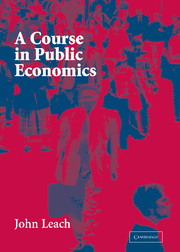Book contents
- Frontmatter
- Contents
- List of Figures
- Preface
- 1 Introduction
- Markets
- Externalities
- Public Goods
- Imperfect Competition
- Taxation and Efficiency
- 16 Taxation
- 17 The Welfare Cost of Tax Interactions
- 18 The Theory of the Second Best
- Asymmetric Information and Efficiency
- Asymmetric Information and Income Redistribution
- A Note on Maximization
- References
- Index
18 - The Theory of the Second Best
from Taxation and Efficiency
Published online by Cambridge University Press: 06 July 2010
- Frontmatter
- Contents
- List of Figures
- Preface
- 1 Introduction
- Markets
- Externalities
- Public Goods
- Imperfect Competition
- Taxation and Efficiency
- 16 Taxation
- 17 The Welfare Cost of Tax Interactions
- 18 The Theory of the Second Best
- Asymmetric Information and Efficiency
- Asymmetric Information and Income Redistribution
- A Note on Maximization
- References
- Index
Summary
The theory of the second best states that if all of the distortions in the economy cannot be eliminated, all bets are off. Eliminating or reducing another distortion might raise welfare, but can just as easily reduce welfare. For example, Samuelson recognized that the optimal quantity of a public good would not be characterized by the Samuelson condition if the public good were financed through distortionary taxation. This condition assumes that expanded provision of public goods is costly to consumers only in that it requires scarce resources to be transferred from the production of other goods. However, if the production of public goods is financed through distortionary taxation, providing more public goods is also costly because it increases the amount of revenue that the government must raise, and hence increases the deadweight loss of the tax system. The optimal quantity of a public good when taxes are distortionary is generally (but not always) smaller than that dictated by the Samuelson condition.
This chapter looks at two important illustrations of the theory of the second best: the design of the tax system, and the pricing of goods produced by a regulated or government-owned monopoly.
OPTIMAL TAXATION
Every tax system that raises a significant amount of revenue will impose a deadweight loss upon the economy. The system that raises the required revenue with the smallest deadweight loss is said to be “optimal.”
- Type
- Chapter
- Information
- A Course in Public Economics , pp. 272 - 288Publisher: Cambridge University PressPrint publication year: 2003



